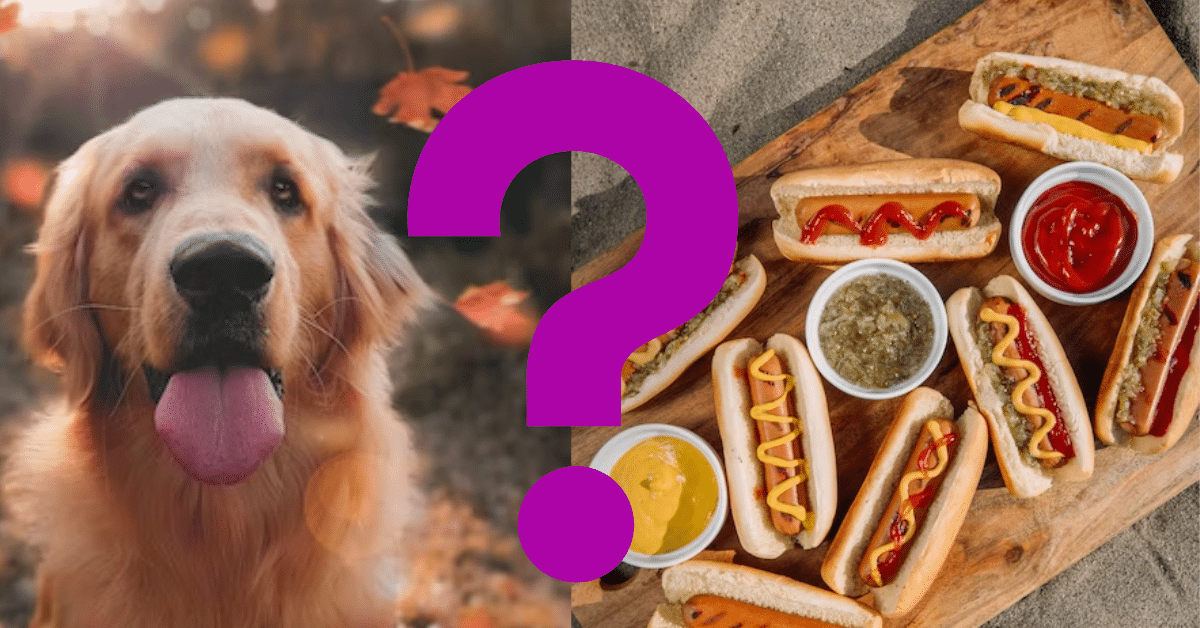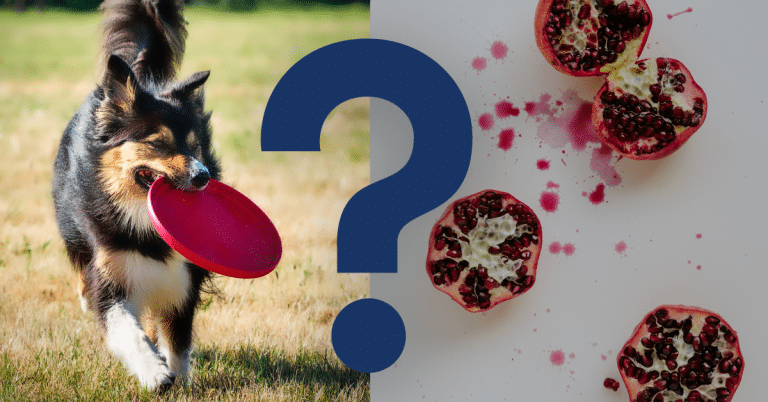Can Dogs Eat Hotdogs? A Vet’s Opinion

Hotdogs are processed sausages from meat (often beef, hog, or chicken) and additional additives. But can you feed hotdogs to your dog?
Yes, dogs can consume hotdogs in moderation, but they should not be used as a regular meal due to their high sodium, cholesterol, and preservative content. Excessive consumption can result in weight gain, pancreatitis, and sodium imbalances. Furthermore, hotdogs like garlic and onions frequently contain additives unsuitable for dogs. If offered, make it plain and without seasonings, and skip the bun, which can be difficult for dogs to digest. Before introducing new items into your dog’s diet, consult your veterinarian.
Benefits of hotdogs for dogs
While hotdogs are not advised as frequent dog treats for the reasons stated above, there are a few potential benefits in minimal and regulated situations:
High-Value Treat
A little piece of hotdog can be used as a high-value treat during training sessions or to encourage good behavior in specific instances. However, use hotdog pieces sparingly and in tiny amounts to minimize harmful health impacts.
Hide Medication
Some pet owners may hide medication in a small piece of hotdog to make it more appealing for dogs who are reluctant to take their medication. Again, this should be done only under the supervision of a veterinarian and in limited circumstances.
It’s important to remember that these possible benefits should only be regarded as an occasional treat, not a regular part of a dog’s diet. Safer and healthier treats are available for most dogs that give more nutritional content without the hazards associated with hotdogs. Always put your dog’s general health and well-being first by checking with a veterinarian about the best treats for your unique pet.

How to safely give hotdogs to dogs
If you prefer to occasionally offer your dog a small slice of hotdog as a treat, you must do so carefully and responsibly. Here are some pointers to keep in mind:
Moderation Is Key
Hotdogs should be consumed in moderation. The high sodium, fat, and preservative content can be toxic to dogs in significant doses. Only give them a small slice as a treat, and don’t make it a regular component of their diet.
Plain And Cooked
Always offer your dog plain, unseasoned, and wholly cooked hotdog chunks. Avoid hotdogs with onions, garlic, spices, or other potentially dangerous additions. Uncooked hotdogs are more prone to bacterial contamination and should never be fed to dogs.
Cut Into Small Pieces
Cut it into small, bite-sized pieces before giving your dog a hotdog treat. It will make chewing easier for them and lessen the possibility of choking.
Remove The Bun
If you’re using a hotdog with a bun, take it off before feeding it to your dog. The bun may be challenging to digest for dogs and may provide a choking hazard.
Supervise While They Eat
Always keep an eye on your dog while they are enjoying a hotdog reward. You may observe their chewing and ensure they don’t swallow large chunks or have any complications this way.
Consider Health Conditions
If your dog has health issues, particularly those involving the pancreas, kidneys, or gastrointestinal system, avoid offering them hotdogs. Specific health problems can be exacerbated by excessive fat and sodium intake.
Alternatives For Dog Treats
There are safer and healthier dog treat options available. As an alternate reward, try tiny pieces of cooked lean meats (like chicken or turkey), fruits (like apple slices or berries), or vegetables (like carrots or green beans).
Consult Your Veterinarian
Before introducing new foods into your dog’s diet, including hotdogs, consult your veterinarian. They can offer tailored advice based on your dog’s health requirements, dietary limitations, and size.
While hotdogs may be a pleasant treat to share with your dog, remember that their health and well-being should always come first. Responsible treat-giving and a well-balanced diet will keep your pet happy and healthy for many years.
Will hotdogs make a dog sick?
Hotdogs have the potential to make a dog sick for a variety of causes, including:
High Sodium
Hotdogs are typically heavy in salt, which can cause excessive thirst, dehydration, and kidney strain in dogs.
High Fat
Hotdogs’ high-fat content can cause gastrointestinal disturbance and may result in pancreatitis, a painful and sometimes fatal illness in dogs.
Additives And Seasonings
Hotdogs include preservatives and additives unsuited for dog digestion and can result in stomach difficulties.
Onions And Garlic
Some hotdogs may contain onions or garlic, which are poisonous to dogs and can cause red blood cell destruction.
Choking Hazard
Hotdogs can be a choking hazard for dogs, especially smaller breeds, if not sliced into small, manageable pieces.
Uncooked Hotdogs
Uncooked hotdogs provide a bacterial contamination danger and should never be fed to dogs.
Allergies And Sensitivities
Certain substances in hotdogs might cause allergic responses and skin problems in dogs.
Dental Problems
The sugar in hotdogs can contribute to tooth problems such as plaque and tartar accumulation.
While offering a little slice of plain, fully cooked hotdog as a treat may not cause immediate harm to all dogs, it is critical to be cautious and aware of the potential risks. Before introducing new foods into your dog’s diet, please consult your veterinarian, and seek safer and better treatment alternatives for their general well-being.
Can dogs eat hotdogs variations?
Dogs can eat hotdog varieties, but care must be taken, and specific considerations must be considered. The main issue with hotdogs, whether in their conventional form or as modifications, is their high fat, salt, and preservative content, as well as the inclusion of additives such as onions and garlic, which can be hazardous to dogs.
If you want to give your dog a hotdog variation as a treat, check to see if the variety has any potentially toxic components, like onions, garlic, spices, or other harmful additives. Putting your dog’s health and well-being first and foremost is critical. While some hotdog versions may be safer than others, other alternative snacks are healthier and more appropriate for dogs. Consider utilizing small portions of prepared lean meats, fruits, or vegetables that are safe and nutritious for dog ingestion if you wish to treat your dog.

Vet’s Summary
The article discusses the potential dangers of feeding hotdogs and hotdog variations to dogs. Hotdogs are processed, heavy in sodium, fat, and preservatives, and can cause obesity, pancreatitis, and kidney strain in dogs. Some hotdogs may also contain hazardous additives such as onions and garlic. The article emphasizes the need to give hotdogs to dogs in moderation, if at all, and recommends looking into safer treatment options that are healthier and better suited for dog digestion.
Given the potential hazards and digestive issues that dogs may have when consuming hotdogs, dog owners may consider giving their pets probiotic supplements. Probiotics can help sustain a healthy gut flora and improve digestion, which is helpful if the dog accidentally takes unhealthy or unfamiliar foods. Probiotics are also good if the dog has had gastrointestinal upset or antibiotic treatment since they help restore healthy gut bacteria balance. However, before introducing new supplements, the owner should contact their veterinarian to establish the best probiotic product and dose for their dog’s needs and health issues. To ensure their dog’s general health and well-being, the owner should keep providing balanced and nutritionally adequate meals and treats.
Videos to watch
If you are wondering if you can give your dog hotdogs, watch this:
And if you want to know what a dog can NOT eat, watch this:






